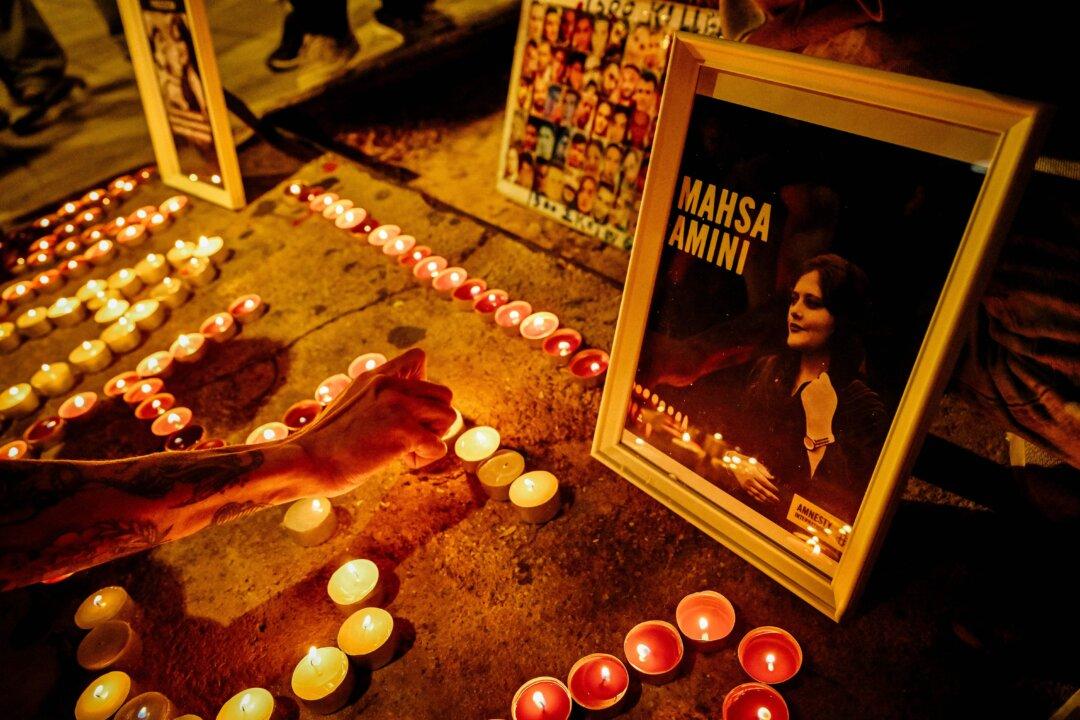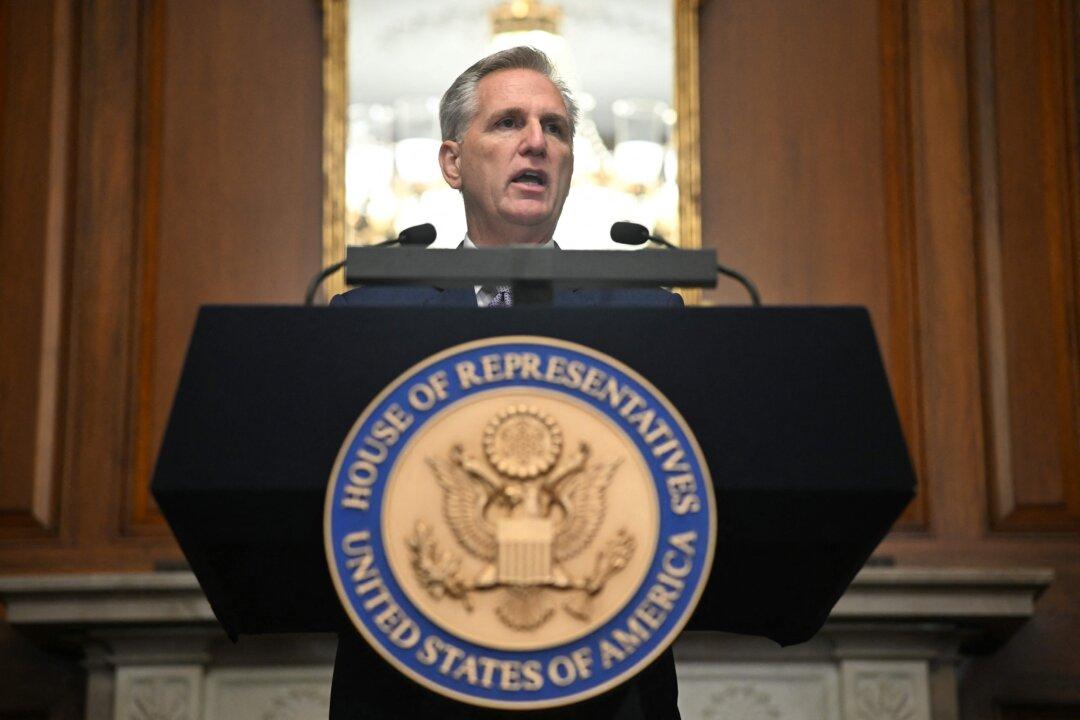It’s an image of contrasts, courage, and confrontation: A faceless Iranian woman protester holds Catholic rosary beads against the backdrop of a poster featuring Mahsa Amini, a young woman who died last year while being held by the country’s morality police. Her alleged crime: standing up to the country’s theocratic regime by violating laws requiring women to wear head coverings in public.
USCIRF Chairman Nury Turkel said the commission chose the image to highlight the Iranian government’s “severe brutality” against the religious rights of people of various faiths and nonreligious communities. Turkel decried the use of violence against girls and young women and the country’s deplorable and deteriorating religious freedom conditions in the wake of the recent protests.
“Iran’s security forces have shot and killed peaceful protesters, detained, and tortured others, and engaged in a systematic campaign of sexual and gender-based violence against not only women and men but boys and girls as well,” Turkel said Monday at an event releasing the report.
The USCIRF report determined that the circumstances in Iran amount to “systematic, egregious, and ongoing” religious freedom violations, which require Iran to remain on the State Department’s list of “countries of particular concern,” or CPCs.
The watchdog, which Congress created to shine a light on religious freedom violations around the world and provide recommendations to Congress and the executive branch, redesignated a total of 12 countries as CPCs based on information and analysis it gathered in 2022, including Myanmar (which the department and USCIRF refer to as Burma), China, Cuba, Eritrea, Iran, Nicaragua, North Korea, Pakistan, Russia, Saudi Arabia, Tajikistan, and Turkmenistan.
The commission also pressed Congress and the Commerce Department to prohibit lobbyists from receiving compensation from countries that engage in particularly severe religious freedom violations and other “egregious” human rights abuses. The recommendation, if enacted, would hit the U.S. lobbying community, which works on behalf of U.S. foreign adversaries, including former members of Congress who now lobby Congress and the federal government on behalf of Chinese countries, an increasingly controversial practice, with tensions between Washington and Beijing intensifying over its threats to Taiwan, closer ties to Russia, and the massive scale of its human rights violations.
The report took issue with the State Department’s failure to designate Afghanistan, India, Nigeria, and Syria as CPCs last year despite USCIRF’s recommendations to do so and what it characterized as the State Department’s “own reporting documenting the nature and extent of religious freedom violations in those countries.”
Nigeria’s blasphemy laws and violence are wiping out faith-based freedoms, the report said, noting a death sentence for a leader accused of blasphemy, as well as a mob killing of a student charged with the same crime, and the arrests of people accused of organizing a same-sex wedding. It also condemned the massacre of 40 people in a Catholic Church in the state of Ondo on Pentecostal Sunday, June 5.
“The central government’s failure, state-level governments’ repression, and religiously motivated violence by non-state actors have turned Nigeria into a hotbed of persecution, particularly in the north,” Turkel said Monday, arguing that the State Department should re-designate the nation as a CPC, as the Trump administration did in 2020. Turkel also called on President Biden to appoint a special envoy to Nigeria to address the persecution, which has gone on for decades but has grown increasingly bold and deadly.
The commission also expressed “tremendous disappointment” that the State Department last year disagreed with its previous recommendation to designate India as a CPC.
“Through the year, the Indian government at the national, state, and local levels promoted and enforced religiously discriminatory policies, including laws targeting religious conversion, interfaith relationships, the wearing of hijabs, and cow slaughter, which negatively impact Muslims, Christians, Sikhs, Dalits, and Adivasis (indigenous peoples and scheduled tribes),” the commission stated.
The report condemned the criminalization of interfaith marriages and the disturbing attacks and property destruction that Muslims and Christians experienced.
“Hindu nationalists bulldozed a Catholic center near Mangalore in February and attacked, looted, and destroyed the homes of hundreds of Christians in December for their refusal to convert to Hinduism,” the report said. “In addition, at least four madrasas were demolished following a statement in May from the chief minister of Assam that madrasas should be eliminated.”
The report also highlighted the increased violations against Catholics and other believers documented in Cuba and Nicaragua, two countries the State Department added to its CPC list last year. The CPC designation is a U.S. blacklist for governments that “engage in or tolerate ‘particularly severe’ violations of religious freedom.” It allows the U.S. secretary of state to consider a range of policy options, including imposing sanctions.
“In Cuba, religious freedom conditions in 2022 worsened considerably, with the government seeking total dominance over religious life in the country,” the report stated. “Additionally, the regime in Nicaragua has sharply increased its persecution of the Catholic Church by imprisoning clergy, shuttering church-affiliated organizations, and prohibiting Catholic rituals.”
In February, the Ortega regime deported 222 political prisoners, including Catholic priests, seminarians, and a deacon, to the United States and stripped them of their Nicaraguan citizenship. One day after the deportation, Bishop Rolanda Alvarez of Matagalpa, who refused to leave with the rest of the 222 political prisoners, was convicted of treason, stripped of his citizenship, and sentenced to 26 years in prison.
Over the last two years, the Nicaraguan government has shut down universities and Catholic media, expelled nuns, and outlawed Catholic processions.
The commission lauded the State Department’s decision last year to add Nicaragua and Cuba to the CPC blacklist for the first time.
“Throughout the year, the Cuban government tightly controlled religious activity through surveillance, harassment of religious leaders and laypeople, forced exile, fines, and ill-treatment of religious prisoners of conscience,” it said.
It highlighted the Cuban government’s nonrenewal of the residence permit of Jesuit Fr. David Pantaleon, leader of Cuba’s Jesuit province and president of the Conference of Religious Men and Women in Cuba, whom the regime expelled from the country. Pantaleon “reported that the [Cuban Office of Religious Affairs] cited his support for political prisoners and the Jesuits’ critical positions toward the regime as the main reasons for his expulsion.”
In Afghanistan, the commission lamented the diminished religious diversity of a country that experienced a “horrific campaign of violence” against Afghan religious minorities that previously was home to “an array of ethnic groups, including Pashtuns, Tajiks, Hazaras, Uzbeks, Turkmen, and Balochs.” Yet, after the Taliban seized control in 1996, most non-Muslims fled, and many of those who remained left the country following the U.S. withdrawal in August 2021. The country’s current population of more than 38 million is approximately 99.7 percent Muslim, with the few remaining non-Muslims (Hindus, Sikhs, Bahá’ís, Christians, Buddhists, Zoroastrians, and others) comprising the remaining 0.3 percent. The country’s last remaining Jew, Zebulon Simentov, left in 2021, the report noted.
The report decried the sweeping restrictions the Taliban has placed on Afghan society based on the regime’s interpretation of religious law, especially the “disastrous” and “repressive” policies against the country’s women, an effort to “implement its vision of religious law that excludes Afghan women from all opportunities and aspects of public life.”
It noted that the State Department late last year redesignated the Taliban as an “entity of particular concern,” or EPC, for engaging in “particularly severe violations of religious freedom,” but did not designate Afghanistan as a CPC. It conceded that the reason was likely “due to its nonrecognition of the Taliban as the de facto government authority, but the report said State also failed to designate ISIS-K as an EPC, likely because of the group’s lack of territorial control.”
The commission bemoaned the declining religious freedom conditions in Myanmar, (USCIRF refers to the country as Burma) which have continued to deteriorate since the country’s junta, the Tatmadaw, staged a military coup in February of 2021 and has ruled through the State Administration Council, or SAC, under the leadership of General Min Aung Hlaing. The SAC has complete control of only an estimated 17 percent of the country’s territory, but in “that limited space, it has significantly cracked down on all dissent and freedoms.”
“The government violently targeted houses of worship belonging to religious minorities throughout the year, with evidence suggesting the SAC is using the same tactics against these communities that its forces have deployed against Muslim-majority Rohingyas since 2017,” the report stated. Both the Biden and Trump administrations declared that members of the country’s military committed genocide and crimes against humanity against the Rohingyas.
Last year in China, religious freedom conditions continued on a steep decline as the government has stepped up the implementation of its “Sinicization of religion” policy and “demands that religious groups support the Chinese Community Party’s [CCP] rule,” the report found.
Although China officially recognizes Buddhism, Catholicism, Islam, Protestantism, and Taoism, “groups with perceived foreign connections—such as Uyghurs and other Muslims, Tibetan Buddhists, underground Catholics, and house church Protestants—are especially vulnerable to persecution,” the report stated. It condemned the ongoing genocide against Uyghurs and the intensifying suppression of Tibetan Buddhism, continued persecution of Falun Gong, and increased detentions and prosecutions of Catholics and Protestants.
The report noted that CCP authorities reportedly tortured Tibetan monks in prison and repeatedly stated its intent to interfere in the Dalai Lama’s reincarnation, claiming it has the ultimate authority to appoint his successor. Last year alone, at least three Tibetans self-immolated in protest of the government’s policies in Tibet. Authorities also reportedly conducted mass DNA collection in Tibet, “likely to strengthen surveillance and control there,” the report found.
Even though the Vatican and China renewed an agreement on bishop appointments, in December the Vatican protested the government’s installation of a bishop without its approval. And, across China, “authorities detained or otherwise forcibly disappeared Catholic priests and bishops, including Bishop Joseph Zhang Weizhu and Bishop Augustine Cui Tai—who refused to join the state-controlled Chinese Catholic Patriotic Association,” the report found.
In May of 2002, Hong Kong authorities arrested 90-year-old Cardinal Joseph Zen, the bishop emeritus of Hong Kong, accusing him of colluding with foreign forces under the new National Security Law related to his support for the widespread 2019 pro-democracy protests, the report noted. Zen was eventually found guilty and forced to pay a fine but still faces other charges that carry a maximum penalty of life imprisonment. Hong Kong religious freedom advocate Jimmy Lai, another high-profile Catholic figure, is serving prison terms on charges related to his political activism.
The China section included an additional statement by USCIRF commissioners condemning the “untold profits” lobbyists for China are “raking in” for what they characterized as “whitewashing the records and aims of the Chinese Communist Party and government.”
“At the height of Cold War hostilities, it would have been unthinkable for any reputable firm to take on the Soviet Union as a client,” they wrote. “... It’s time to make this activity illegal.”






